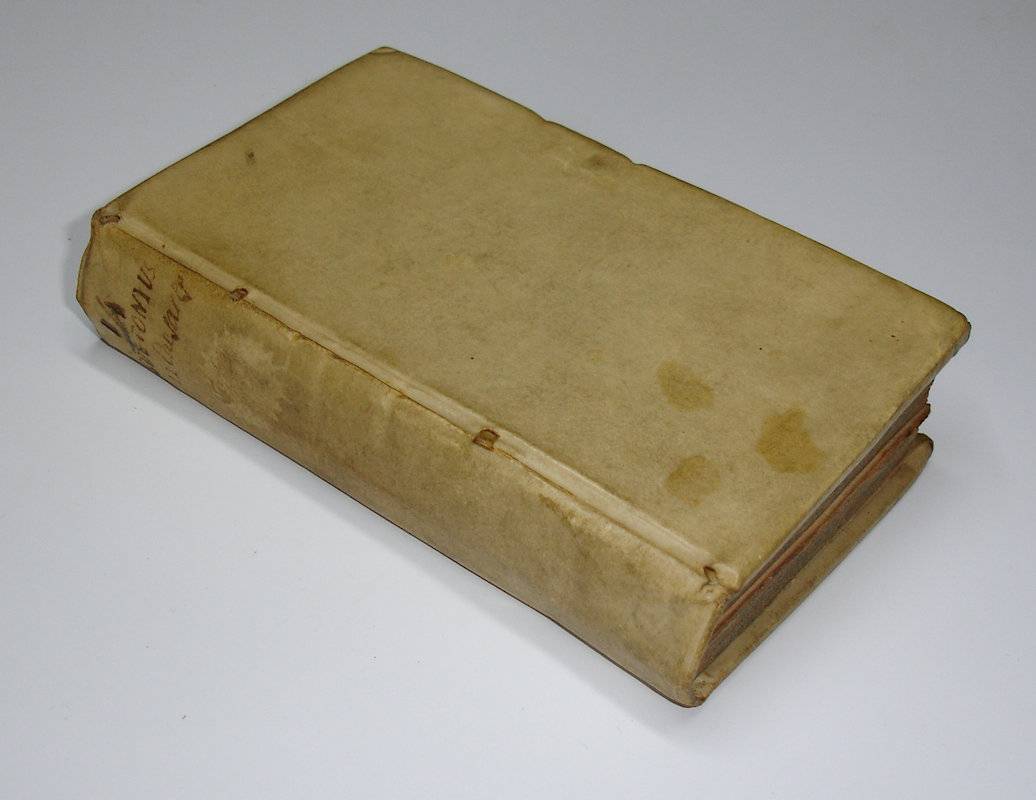SUETONIUS.
Cajus Suetonius Tranquillus, ad optimorum exemplarium fidem castigatus.
Leiden (Lugduni Batavorum), Apud S. et J. Luchtmans, 1767.
12mo. (VI),408 p. Vellum 14 cm (
Ref: Schweiger 2,980; Ebert; 21938) (
Details: The frontispiece depicts the author at a desk, having a book before him; he seems to discuss with an emperor (Trajan or Hadrian). In the background two rows with busts of emperors) (
Condition: Binding age-toned and slightly soiled. Paper yellowing. One gathering loosening. Some small ink marks) (
Note: The Roman historian Suetonius, born c. 69 A.D, is the most influential and best known biographer in the Latin language. He was appointed under the emperors Hadrian and Trajan to the secretarial posts of
a studiis, a bibliothecis, and
ab epistulis of the palace administration, jobs that gave him access to the imperial archives. His Lives of the Emperors
De vita Caesarum offers the biographies of 12 emperors, from Caesar, the founder of the imperial line, to Domitian. 'Suetonius, like Plutarch, believed that a person's character could be revealed in small and insignificant details'. He 'organized his Lives by topics (
per species) rather than chronologically' (The Classical Tradition, Cambr. Mass. 2010, p. 912/13). Beyond simplicity he has no stylistic pretentions. He quotes verbatim from documents he knew, and shows critical ability. 'The great number of scurrilous anecdotes in most of the lives may be due to the nature of his sources'. (OCD, 2nd ed. p. 1020/1)
§ Suetonius was read in the Middle Ages. Einhard wrote a biography of Charlemagne along the lines of a Life of Suetonius. From the Renaissance onward he was neglected, until the great edition of 1672 by Graevius. Gibbon praised this Roman historian for his strict dedication to historical truth. Nowadays 'historians of Rome take him more seriously than do literary critics'. (The Classical Tradition, Cambr. Mass., 2010, p. 913)
§ In the short preface to this edition of 1767 the publisher explains that he has noticed a demand for a handy pocket-Suetonius by schoolboys and men of letters (
eruditis). He mentions three available scholarly editions, all excellent, that of Burmannus, of Ernesti and of Oudendorp. He compared (i
nter se comparatis), he goes on, the text of these three editions, and concludes that the best text to follow is of course that of Oudendorp of 1751 (
Oudendorpiam omnium accuratissime textum constitutum habere). This choice does not come as a surprise, for Luchtmans was also the publisher of the 1751 edition of Oudendorp.
§ The Dutch classicist Frans van Oudendorp, 1696-1761, is called by Sandys 'the last of the great Latinists of the third age of scholarship'. (History of Classical scholarship' 2,454) He was a student at Leiden of Jacobus Gronovius, Jacobus Perizonius and Petrus Burmannus Sr, and in 1740 he was appointed professor of history and rhetoric at his own University. He produced a series of important editions of Latin classics, of Julius Sequens, Lucanus, Fronto, Caesar and Apuleius. (Van der Aa 14, 267/68) In the preface of his Suetonius of 1751 Oudendorp declares that he is not a devotee of any text in particular, (
nulli editioni addictus), but that he chose to follow the editions published by Graevius (1672, 1691, 1697 and 1702) and by Gronovius (1698), and that he followed his own judgement. He consulted also 'haud sine fructu' several manuscripts for 'variae lectiones') (
Collation: pi3, A-P12, R10, S2) (Photographs on request)
Book number: 120449 Euro 160.00
Keywords: (Oude Druk), (Rare Books), Biographie, Latin literature, Roman history, Sueton, Suetonius, antike altertum antiquity, biography, emperors, römische Geschichte, römische Literatur
 SUETONIUS.
SUETONIUS.

